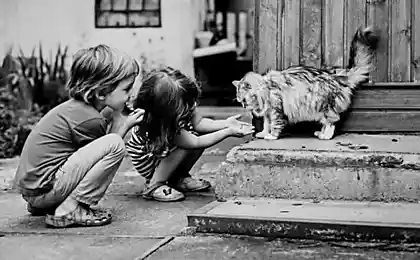465
Why don't need to give their children expensive gifts
Ninety million five hundred nine thousand seven hundred ten
Next time you want to fill up their child's gifts, then think twice.
Researchers from the University of Missouri interviewed thousands of young adults to find out which system of education do you prefer modern parents. It turned out that most of them prefer to educate their children with financial incentives.
This means that if they want to show care and love towards the child, often buy him a gift. If you want to punish the child, allow him to enjoy some things. And if you want to teach it to some kind of order, it is almost always used for material incentives — money or promises to give a new gadget.
The results of this very interesting study published in the journal of Consumer Research.
Scientists came to the conclusion that more and more young mothers and fathers stimulate children with money or things. Made the bed — buy the ice cream; get good grades in school — buy the iPhone at the end of the quarter; helping mom clean the apartment — I'll buy you new jeans.
At first glance it seems that everything is logical: on the one hand, the child understands that the money and gifts appear in his life "not just" on the other — the child always has an incentive to become better.
But researchers have found that this approach has at least two drawbacks. First, material gifts do not make children happy. This is confirmed by research. Second, children who are brought up thus, getstartstate to evaluate themselves and others based on the property they own. If you pay your child for good behavior, he's on a subconscious level, without even knowing the worst start to treat children who do not have as cool of toys.
That explains a lot, doesn't it? Have you ever wondered why the students ostracize those children who do not have a cell phone? Or why students are forced to "pay" money or toys those who are weaker than them?
The same applies to the opposite incentives. If you take the child the opportunity to enjoy your favorite things that he brought home a deuce, don't be surprised if in a month you will be called to school for what he takes away toys from the weaker kids.
But even worse are the long-term effect, which provides this type of education.When these children grow up, the tightly linked social success and things that they own. It seems to be good: the money necessary for a normal life, to earn them is good, not bad, but the pursuit of money can save a child from drug addiction or promiscuity.
But the American psychological Association notes that people who associate the possession of material things with social status, almost never happy. Studies show that they are more likely to get injured, more likely to suffer from depression and loneliness, have problems in relationships.
How you like them apples?
There's only one way to spare their child from such "pleasures": to spend more time with him. And instead of material gifts more often to give him new experiences. Next time when your son will bring home from school an " a " in math or without a reminder mom made in the morning bed, do not buy him a toy. Better take him in the Park. Or watch his favorite cartoon.published
Author: Konstantin Shiyan
Source: lifter.com.ua/post/777
Next time you want to fill up their child's gifts, then think twice.
Researchers from the University of Missouri interviewed thousands of young adults to find out which system of education do you prefer modern parents. It turned out that most of them prefer to educate their children with financial incentives.
This means that if they want to show care and love towards the child, often buy him a gift. If you want to punish the child, allow him to enjoy some things. And if you want to teach it to some kind of order, it is almost always used for material incentives — money or promises to give a new gadget.
The results of this very interesting study published in the journal of Consumer Research.
Scientists came to the conclusion that more and more young mothers and fathers stimulate children with money or things. Made the bed — buy the ice cream; get good grades in school — buy the iPhone at the end of the quarter; helping mom clean the apartment — I'll buy you new jeans.
At first glance it seems that everything is logical: on the one hand, the child understands that the money and gifts appear in his life "not just" on the other — the child always has an incentive to become better.
But researchers have found that this approach has at least two drawbacks. First, material gifts do not make children happy. This is confirmed by research. Second, children who are brought up thus, getstartstate to evaluate themselves and others based on the property they own. If you pay your child for good behavior, he's on a subconscious level, without even knowing the worst start to treat children who do not have as cool of toys.
That explains a lot, doesn't it? Have you ever wondered why the students ostracize those children who do not have a cell phone? Or why students are forced to "pay" money or toys those who are weaker than them?
The same applies to the opposite incentives. If you take the child the opportunity to enjoy your favorite things that he brought home a deuce, don't be surprised if in a month you will be called to school for what he takes away toys from the weaker kids.
But even worse are the long-term effect, which provides this type of education.When these children grow up, the tightly linked social success and things that they own. It seems to be good: the money necessary for a normal life, to earn them is good, not bad, but the pursuit of money can save a child from drug addiction or promiscuity.
But the American psychological Association notes that people who associate the possession of material things with social status, almost never happy. Studies show that they are more likely to get injured, more likely to suffer from depression and loneliness, have problems in relationships.
How you like them apples?
There's only one way to spare their child from such "pleasures": to spend more time with him. And instead of material gifts more often to give him new experiences. Next time when your son will bring home from school an " a " in math or without a reminder mom made in the morning bed, do not buy him a toy. Better take him in the Park. Or watch his favorite cartoon.published
Author: Konstantin Shiyan
Source: lifter.com.ua/post/777
























